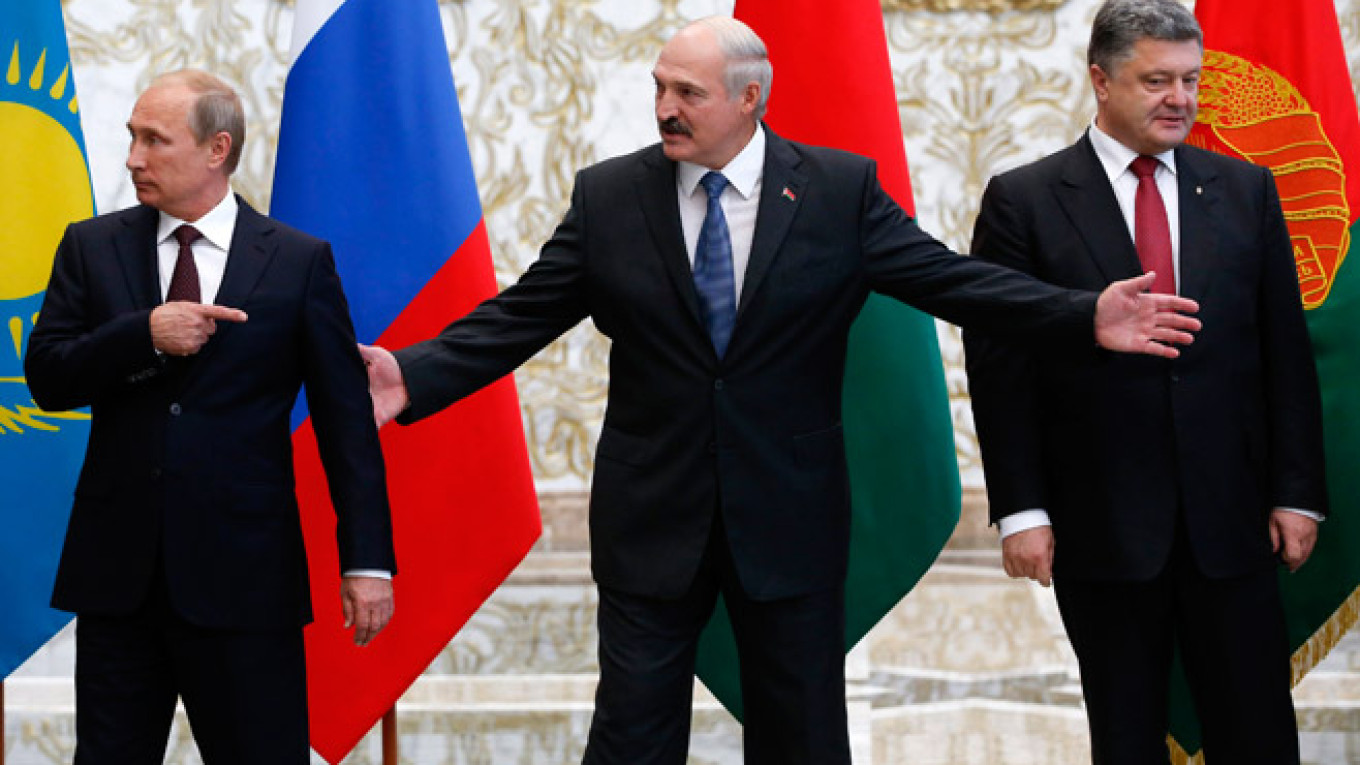Russian President Vladimir Putin urged his Ukrainian counterpart on Tuesday not to escalate an offensive against pro-Moscow rebels, and threatened economic retaliation for signing a trade accord with the European Union.
At the leaders' first meeting since June, Ukrainian President Petro Poroshenko replied by demanding a halt to arms shipments from Russia to the separatist fighters.
The pair shook hands at the start of talks in the Belarussian capital Minsk, only hours after Kiev said it had captured Russian soldiers on a "special mission" on Ukrainian territory.
Responding to a video of the detained servicemen, a Russian Defense Ministry source told Russian news agencies that the servicemen had crossed the border by mistake.
Moscow has long denied charges by Kiev that it has been sending weapons and fighters to help the separatists in eastern Ukraine. The United States and European Union have backed Kiev by imposing sanctions on Moscow in a standoff that has prompted both Russia and NATO to step up military maneuvers.
"We are convinced that today, [the Ukraine crisis] cannot be solved by further escalation of the military scenario without taking into account vital interests of the southeastern regions of the country and without a peaceful dialogue with its representatives," Putin said.
He said the Russian economy could lose about 100 billion rubles ($2.8 billion) if European goods reached its markets via Ukraine after Kiev signed the trade deal with the EU in June. Moscow would retaliate with trade measures if that were to happen, Putin added.
Poroshenko responded by defending a peace plan he issued in June, when the rebels in the southeast Donbass region scorned his invitation to lay down their arms and leave by a safe corridor.
"The prime condition for a stabilization of the situation in Donbass is the establishment of effective control over the Russian-Ukrainian border. It is vital to do everything to stop deliveries of equipment and arms to the fighters," he said.
More than 2,000 people have been killed since April in the fighting, but the Ukrainian army has now largely pinned the rebels down in two eastern strongholds.
EU foreign policy chief Catherine Ashton and the leaders of Belarus and Kazakhstan were also taking part in the Minsk meeting, the first between Putin and Poroshenko since June 6.
Poroshenko pointedly mentioned the other participants by name, but not Putin, referring only to the "presence of the leadership of the Russian Federation."
Russia has called for a ceasefire many times and supports what it calls a "dialogue of national unity" which would boost the authority of Ukraine's regions.
But a unilateral ceasefire by Kiev in June was widely seen by Ukrainians as allowing the rebels a breathing space to regroup, and Poroshenko could find it difficult to win support at home for a repeat, especially as government forces have the upper hand.
Ukraine will also resist any settlement that could give the eastern regions more power over policy decisions, potentially blocking moves by Kiev to shift closer to the EU or NATO.
"Most likely, it's difficult to expect any colossal breakthrough today but we should start progress towards peace," said Belarussian President Alexander Lukashenko, who hosted the meeting.
A Message from The Moscow Times:
Dear readers,
We are facing unprecedented challenges. Russia's Prosecutor General's Office has designated The Moscow Times as an "undesirable" organization, criminalizing our work and putting our staff at risk of prosecution. This follows our earlier unjust labeling as a "foreign agent."
These actions are direct attempts to silence independent journalism in Russia. The authorities claim our work "discredits the decisions of the Russian leadership." We see things differently: we strive to provide accurate, unbiased reporting on Russia.
We, the journalists of The Moscow Times, refuse to be silenced. But to continue our work, we need your help.
Your support, no matter how small, makes a world of difference. If you can, please support us monthly starting from just $2. It's quick to set up, and every contribution makes a significant impact.
By supporting The Moscow Times, you're defending open, independent journalism in the face of repression. Thank you for standing with us.
Remind me later.


